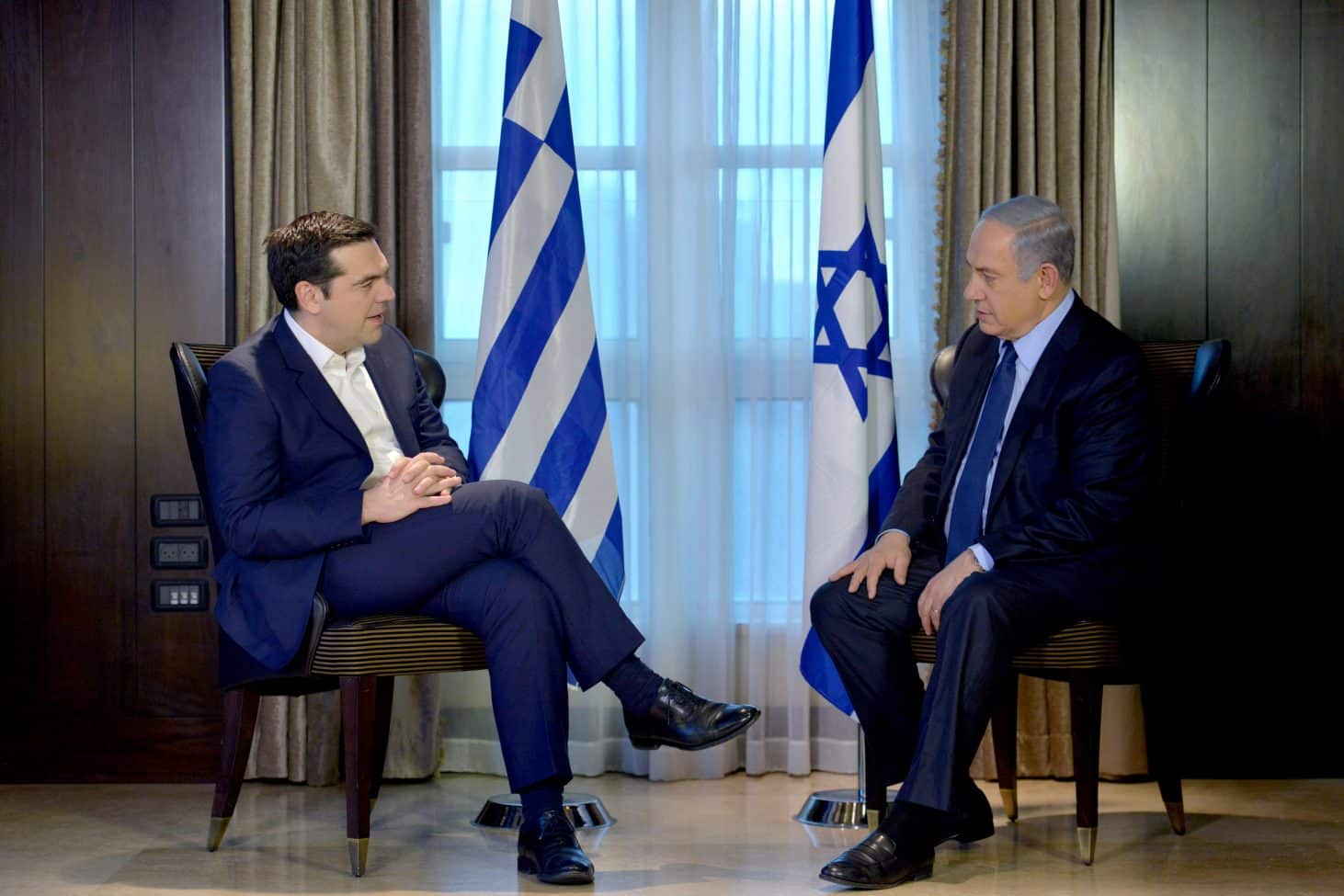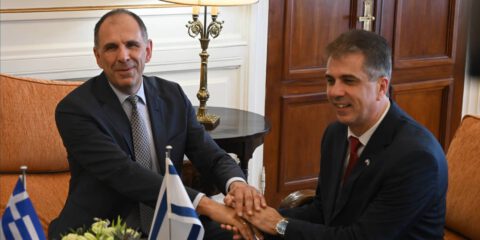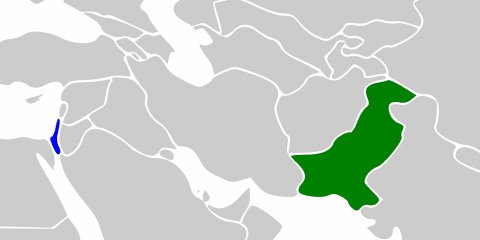Greece, Cyprus and Israel Consolidate their Cooperation.
Amidst the tensions and transformations even of these dramatic days – the American withdrawal from the Iran deal, the violent confrontation in Syria, the ongoing Hamas provocations on the Gaza border, and the opening of the US embassy in Jerusalem – it was easy to lose sight of another landmark event. It is remarkable that by now a tripartite summit of Prime Minister Netanyahu and his fellow eastern Mediterranean leaders – President Anastasiades of Cyprus and Prime Minister Tsipras of Greece – is no longer remarked upon. Their meeting was the fourth of its kind. It has now become part of a broader pattern of consolidated cooperation between the three countries.
Still, the (exceedingly long) joint statement issued in Nicosia on May 8 is a striking document. Like its predecessors (January 28, 2016 in Nicosia, December 8, 2016 in Jerusalem, and June 15, 2017 in Thessaloniki), the statement asserts that this is not an exclusive club. “Like minded” nations are urged to join the efforts to make the eastern Mediterranean safer, more stable and more prosperous.
It is clear that the challenges posed by radical Islamism are one of the main drivers bringing the three together. The same can be said of Turkish provocations, which were referred to, more explicitly than in past joint declarations, as “recent illegal actions in the eastern Mediterranean and the Aegean Sea which are a serious cause for concern, as they violate international law and are contrary to good neighborly relations.”
Thus, the summit statement took note of the tripartite meeting of the three Defense Ministers – Panos Kammenos, Avigdor Liberman, Christoforos Fokaides (held for the first time on November 7, 2017 in Athens) – which “furthers our defense cooperation, including tackling asymmetric threats, contributing to international counter-terrorism efforts, information exchange, cyber defense as well as common exercises on search and rescue.”
The next meeting between the three has been set for next month, June 2018, in Nicosia. Senior officers from the three armies meet regularly, and did so immediately after the summit. The pattern of combined military exercises, established in recent years, seems set to continue and to expand. While it is safe to assume that no plans are actually drawn for a conflict with Turkey, the sheer volume of tripartite activity generates a sense of enhanced security for all three nations.
Among other reasons and purposes, this sense of security is needed. The three countries, as well as Egypt – which has her own tripartite format of consultations with Greece and Cyprus – and Italy (if and when her leaders can ever put their own house in order), are moving ahead with plans to enhance the development of eastern Mediterranean energy resources. The popular press in the Hellenic countries described the meeting as a “gas summit,” and like many oversimplifications, this one, too, has some truth to it. Designs for a pipeline and/or a power link which will connect Israel, Cyprus and possibly Egypt’s Zohr field to European markets are going through feasibility studies (and face some serious practical challenges). This issue certainly took center stage in the tripartite summits held thus far. The common benefits envisioned through broader cooperation in this field will continue to play a major role in moving the relationship between all eastern Mediterranean “like minded” nations ever closer.
The heavily loaded list of issues on the agenda at the summit, however, was by no means confined to energy projects. In fact, an almost bewildering array of subjects was put forward in some detail, ranging from communication technology to health projects, and from the promotion of cruise ship tourism to ESD (Education for Sustainable Development). All this is in fact translated into regular tripartite consultations at the level of the relevant ministers and senior professional officials, as well as inter-parliamentary meetings. The sheer scope and intensity of these activities serve as proof that the summitry is no longer just a political act at the leadership level. It is reflected in a closely-woven fabric of cooperative projects that will secure the emerging strategic partnership, with its long-term implications for regional security, for years to come.
A special emphasis was put in the joint statement on the need for more intensive “people to people” interactions, and for closer cultural dialogue. The summit itself was accompanied by a trilateral conference of the three countries chambers of commerce, emphasizing the role of non-governmental institutions in building bridges. This was even reflected this week, symbolically, by the personal friendship between the two top contenders for the first place in the Eurovision song contest – the Israeli Netta Barzilai, who won, and Eleni Foureira, the Cypriot (actually Greek) runner up. Their mutually supportive behavior was reminiscent of Israel’s first ever Olympic gold medalist, the windsurfer Gal Fridman, and his good Greek friend, Atlanta gold medalist Nikolaos Kaklamanakis, who in the 2004 Athens games settled for the silver.
One more interesting note was struck by the choice of Beersheba to host the next (fifth) tripartite summit later this year. This is part of a pattern. Israel’s “capital of the Negev Desert” – in addition to securing, this weekend, the Israeli soccer championship for the third year in a row – is fast rising as an important city, technologically and academically. At the core of the rise stands the Prime Minister’s vision of turning the city into “the cyber capital of the world.” He hopes, at least, to make the city a focal point for cyber defense corporations which would benefit from the synergy between business groups, research centers, and the bright crop of young people graduating from the relevant IDF units. Greece and Cyprus, too, stand to benefit from close cooperation in this field, and the next summit is bound to focus on such emerging opportunities.
JISS Policy Papers are published through the generosity of the Greg Rosshandler Family.
photo: Kobi Gideon, GPO








 - בניית אתרים
- בניית אתרים